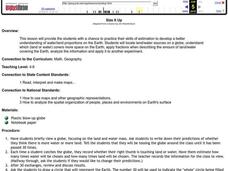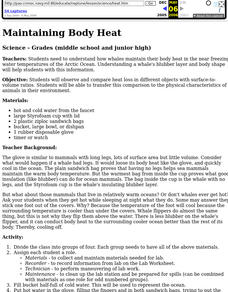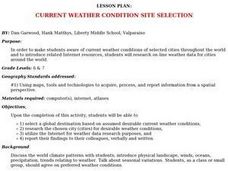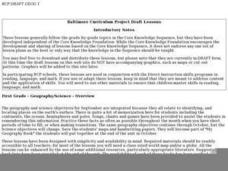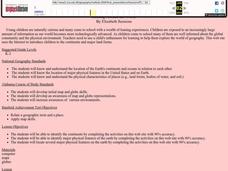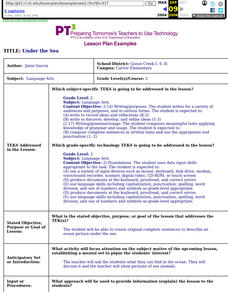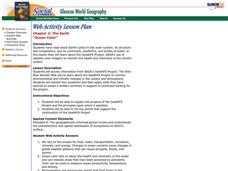Curated OER
Learning From Leaves: Adaptation Scavenger Hunt
Students participate in an adaptation scavenger hunt at. They obtain various plant specimens, and sort the plants based on whether they came from a desert, tropical rainforest, or wetlands.
Curated OER
Size It Up
Students practice their math skills in determining the water/land proportions of the Earth. Using globes, they locate the seven continents and oceans and determine which covers more space. They use this information to participate in...
Curated OER
Science: The Water Cycle
Students examine the various stages of the water cycle. In groups, they complete a hands-on activity by creating model water cycle. Students design posters representing each of the seven stages of the water cycle.
Curated OER
The Splendor of Canada's Provinces and Territories
Sixth graders use a map of Canada to label all provinces and territories as well as write information about each location. Using books, they read about each province and territory and write down adjectives describing them. They paint a...
Curated OER
Coastal Biodiversity of South Africa
Students investigate the biodiversity found along the coast of South Africa. They conduct research using a variety of resources. They use the information in order to write lab reports with the data. The lesson can be adapted to other...
Curated OER
Clouds as Art: Torn Paper Landscape
Students create a torn paper landscape and use it to study clouds. In this cloud study and art lesson, students make a background art image from torn paper. Students create a torn paper landscape and use cotton balls to illustrate...
Curated OER
Maintaining Body Heat
Students observe and compare heat loss in different objects with surface-to-volume ratios. They transfer this comparison to the physical characteristics of animals in their environment. They focus on how whales maintain their body heat.
Curated OER
Building A Model of the East Pacific Rise
Students describe the physical attributes of the East Pacific Rise. After locating the region on a map, students work in groups do define each layer of the structure in order to begin their build. Students build their model according to...
Curated OER
The Fossil Record
Students research about the animals found in Burgess Shale. In this earth science lesson, students evaluate the significance of fossils in human history. They create models of their chosen animal.
Curated OER
Nudibranchs-Splendid Sea Slugs
Students brainstorm a list of colorful animals and research why they are colorful. In this biology lesson, students sketch what a nudibranchs look like before watching a video. They compare their sketch to the actual...
Curated OER
Current Weather Condition Site Selection
Young scholars work together to agree on the days "preferred weather conditions." They choose a city in the world they think will have the preferred current weather conditions.
Curated OER
Somewhere in the World . . . .
Students, in groups, choose a country. On the surface of an inflated balloon, they draw/write information (geographic and otherwise) about the country. To finish the project, they make a basket for the balloon and then give a 2-3...
Curated OER
Investigating Ocean Life
Sixth graders explore the various forms of ocean life. They research a creature that lives in the ocean. Students use their research information to create a series of HyperStudio stacks about their sea creature.
Curated OER
Geography: Continents
First graders identify basic geographical facts about the world they live in and distinguish between land and water on a globe. They research the continents and information associated with each one focusing on building their map skills.
Curated OER
Reading Around the World
Students use the internet to identify the seven continents. Using maps, they locate and identify major physical features of Earth. They are read different books by various authors on the Earth and answer questions related to it. They...
Curated OER
Breaking it Down
High schoolers will identify the factors that contribute to erosion and weathering. They will start by differentiating between chemical and mechanical weathering. They then apply what they learned by playing the online jeopardy game. Key...
Curated OER
El Nino
Students recognize that El Nino is caused by changes in the atmospheric and ocean content. They conduct a simple experiment, visit websites and create a class poster using individual storyboards.
Curated OER
Maps
Maps, globes, and computer software aid young explorers as they locate state capitols, major cities, geographic features, and attractions for states they are researching. They then use desktop publishing software to create a map to share...
Alabama Learning Exchange
Diverse Life Forms of the Ocean
Young scholars recognize marine organisms and differentiate between plankton and nekton. In this investigative instructional activity students create a concept map using their list of terms and study marine life forms.
Curated OER
Ocean Creature Classification
Students develop a Taxonomic Key for marine invertebrates from pictures they are given after practicing together with common objects, such as shoes. They then compare their key to a provided Ocean Invertebrates Taxonomic Key.
Curated OER
Under The Sea - Describing an Ocean Picture
Second graders create original complete sentences to describe an ocean picture under the sea. After a lecture/demo, 2nd graders use a software program to create their own undersea scene, complete with pictures and writing.
Curated OER
An Introduction to the Ocean World
Students comprehend how the organisms that exist within the ocean biome, and categorizing each into producer, consumer, or decomposer. They place various human actions under the headings of "hazard" or "help," illustrating how humans can...
Curated OER
How Harmful Is It?
Pupils complete a form that requires them to make decisions about how severely different types of marine debris affect people, animals, vessels, communities. Results are totaled and analyzed to determine which types of marine debris are...
Curated OER
Ocean Color
Students examine NASA's SeaWiFS Project Web site to explore how the SeaWiFS Project monitors environmental and climatic changes in the oceans and atmosphere. They answer questions and write a summary in support of continued funding for...
Other popular searches
- Math Lessons on Oceans
- Pre K Lessons on Oceans
- Prue K Lessons on Oceans
- Drama Lessons on Oceans
- Pr K Lessons on Oceans

